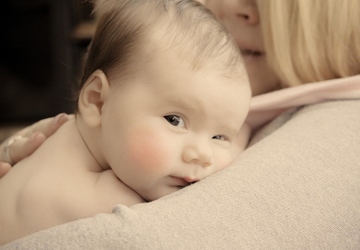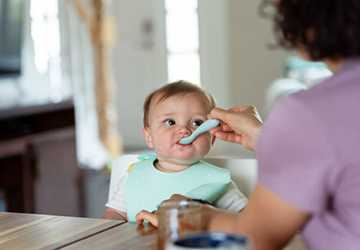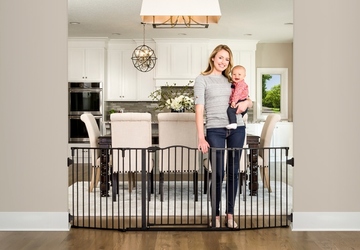How to Introduce Pets to Your Newborn: Safety First
Welcoming a new addition to your family is an incredibly joyous occasion, but it also comes with challenges and adjustments. Among these adjustments, introducing your beloved pets to your newborn baby is a paramount concern for many new parents. It's crucial to ensure a safe and harmonious coexistence between your furry friends and the latest family member. This article will guide you through introducing pets to your newborn, focusing on safety as the top priority.
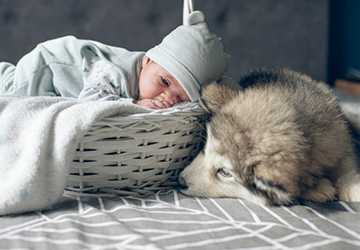
1.Preparation is Key
Before your baby arrives, it's essential to prepare your pets for the upcoming changes. If you haven't already, start by establishing a consistent routine for your pets. This will help them adjust to sharing your attention and space. Gradually reduce the amount of attention and physical contact they receive from you, preparing them for the inevitable decrease in one-on-one time.
Another vital aspect of preparation is ensuring your pets are up-to-date on vaccinations and parasite control. This not only protects your baby but also keeps your pets healthy. Consulting with your veterinarian is a good practice to confirm that your pets are in top shape.
2.Gradual Introduction
Once your baby is home, resist the urge to introduce abruptly. Instead, opt for a gradual and controlled process. Remember that pets are creatures of habit and may be startled by sudden environmental changes. Start by allowing your pets to explore the new smells and sounds associated with the baby's arrival. They will be curious, and it's essential to let them satisfy that curiosity.
You can bring home a piece of your baby's clothing from the hospital to let your pets get accustomed to the baby's scent. This simple act can go a long way in preparing your pets for the introduction.
3.Supervised Encounters
When it's time for the first face-to-face meeting between your pets and your newborn, always keep it supervised. Start with brief, controlled interactions. Have your pets on a leash or crate, and allow them to see the baby from a distance. Keep the atmosphere calm and positive. Offering treats or praise to your pets during these initial encounters can help create positive associations.
If your pets display signs of distress, such as growling or hissing, it's crucial not to scold them. Instead, gently redirect their attention and seek the advice of a professional dog trainer if needed.
4.Maintain Routine
Maintaining your pets' daily routines as closely as possible is vital for their well-being and helps in adjusting to the changes brought about by a new baby. Pets thrive on predictability, so try to feed them, walk them, and provide attention at the exact times before the baby's arrival. This consistency can alleviate their anxiety and minimize any resentment or jealousy they might feel.
If you have a dog, ensure that their exercise needs are met. A tired dog is generally a well-behaved and less anxious dog. Regular exercise will help prevent behavioural issues and ensure your dog is less likely to act out.
5.Establish Boundaries
Setting clear boundaries for your pets is essential to ensure safety and harmony in your home. For instance, if you decide to keep your pets out of the baby's nursery, follow this rule. Baby gates and closed doors can help maintain these boundaries.
Teaching your pets basic obedience commands such as "sit," "stay," and "leave it" can be incredibly useful in ensuring their behaviour around the baby is controlled. Consistent reinforcement of these commands will reinforce your authority and maintain a safe environment.
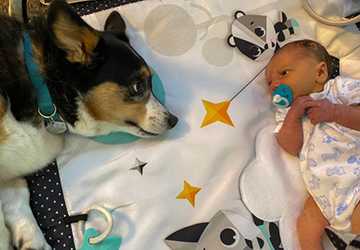
6.Monitor Body Language
Understanding your pets' body language is crucial during the introduction phase. Pets communicate primarily through body language, and being able to interpret their signals can help you anticipate and prevent any adverse reactions.
For dogs, look for signs of anxiety, such as lowered ears, a tucked tail, or a tense body posture. Cats may flatten their ears, hiss, or arch their backs when agitated. It's essential to address these signs promptly to prevent any issues.
7.Hygiene and Safety Measures
Maintaining a clean and hygienic living environment is crucial for your baby's safety. Pets can sometimes carry dirt and allergens, so be diligent about regular grooming and cleaning your pets. Additionally, always wash your hands after handling your pets, especially before tending to your baby's needs.
To further enhance safety, store pet food and litter securely, as curious infants might attempt to explore these areas. Invest in high-quality baby gates to protect your baby from pet food and litter boxes.
8.Never Leave Pets Unattended with a Newborn
This golden rule cannot be stressed enough, as it's the linchpin of ensuring your baby's safety. Even if your pets have displayed nothing but affection and gentleness, the unpredictable nature of animals and the inherent curiosity of babies must be respected. In a split second, an innocent action by a pet could inadvertently harm the baby.
Therefore, it's imperative to maintain unwavering vigilance. Regardless of how busy life can get, always prioritize the physical presence of a responsible adult when your pets and newborn are together. This simple yet paramount guideline is non-negotiable in the delicate balance of pet and baby coexistence.
9.Consider Professional Help if Needed
In some instances, despite your unwavering efforts and commitment to a smooth transition, your pets may exhibit persistent anxiety or display behavioural problems in the presence of your newborn. These challenges can be complex and emotionally taxing for you and your pets. When faced with such circumstances, it's imperative to recognize that professional intervention is a valuable resource.
Certified animal behaviourists and skilled trainers possess the expertise to assess the unique dynamics and offer tailored strategies to address your situation. Seeking their guidance can be the key to fostering a safe, harmonious, and enduring relationship between your pets and your precious new family member.
10.Gradual Socialization
Gradual socialization is a pivotal phase in integrating your pets with your newborn. As your child grows, it's essential to nurture the relationship between them and your furry companions. Encourage gentle interactions, fostering a sense of trust and companionship. Teach your child to respect your pets' boundaries and signals, such as when they need space or wish to play.
Over time, these interactions can transform into endearing and affectionate connections, benefiting your child's development by instilling empathy and responsibility. This gradual socialization process not only enhances the emotional bonds between your pets and child but also ensures a safe, loving, and enriching environment for your entire family.
Conclusion
Introducing your pets to your newborn is a process that requires patience, preparation, and a keen eye for safety. Your pets are an integral part of your family, and with the right approach, they can coexist harmoniously with your new baby. Remember, the safety and well-being of both your pets and your child should always be the top priority. With proper preparation, supervision, and guidance, your furry friends and little ones can develop a loving and lifelong bond.

